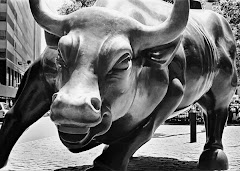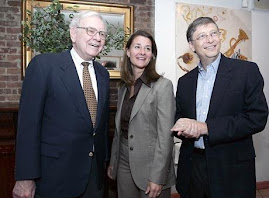I Got My Trading Account, What’s Next?
For beginners, it is easy to get the necessary account set up to buy stocks (I have covered all that in my previous articles). You want to invest base on fundamental and you have all the accounts set up. But there are thousands of listed companies! So how and where should you start?
One thing for sure, you just can’t write to a company’s investor relation manager and ask for a copy of annual report and start reading it. You won’t survive that thick annual report especially if you are just a retail investor. You also just can’t throw darts on the paper and then buy those companies, although the Random Walk theory says that. This Random Walk theory comes from a Princeton University professor named Burton Malkiel. Basically the theory says that stock price moves randomly and historical price movement cannot be used to predict its future movement. Therefore it is pointless to employ ten of thousands of analysts to predict stock prices. So if you use a monkey to throw darts on the list of listed companies and then buy them, you will get same results compared to portfolio created by professional analysts. As you can expect, the analysts are pissed off!!!
“So how about you?”
Me? Well, firstly, I never believe in predicting stock prices. And you will never see me saying something like “expect the stock price to reach $XXX” etc. I had a few friends who love to ask me when a particular stock price will rise”. And I replied: “you are not suitable for investment”. We must understand that man created this stock trading or investment thing; God was never involved. The food chain, water cycle, menstrual cycle (no offence to ladies) and any natural cycles that existed since the creation of earth were created by God; the business cycle is not. Stock trading is not. It was created by man and man has intelligence and a complex mind. Therefore, there cannot be a fix pattern or otherwise, we either become animals or a programme (see the movie Matrix, that explain how human become part of a large programme). However, I equally don’t believe that a monkey produces same result compared to a professional analyst. This is because it is very important to choose the right company to invest.
The Random Walk
Anyway, this argument will continue indefinitely and I think it is more of insulting the chartist, not us (value investors). I will continue to select wonderful companies based on Warren Buffett’s teaching. The following is extracted from Wikipedia on how this professor conducts his test:
Burton G. Malkiel, an economist professor at Princeton University and writer of A Random Walk Down Wall Street, performed a test where his students were given a hypothetical stock that was initially worth fifty dollars. The closing stock price for each day was determined by a coin flip. If the result was heads, the price would close a half point higher, but if the result was tails, it would close a half point lower. Thus, each time, the price had a fifty-fifty chance of closing higher or lower than the previous day. Cycles or trends were determined from the tests. Malkiel then took the results in a chart and graph form to a chartist (a person who “seeks to predict future movements by seeking to interpret past patterns on the assumption that ‘history tends to repeat itself’”) (Keane 11). The chartist told Malkiel that they needed to immediately buy the stock. When Malkiel told him it was based purely on flipping a coin, the chartist was very unhappy. This indicates that the market and stocks could be just as random as flipping a coin.
The random walk hypothesis was also applied to NBA basketball. Psychologists made a detailed study of every shot the Philadelphia 76ers made over one and one-half seasons of basketball. The psychologists found no positive correlation between the previous shots and the outcomes of the shots afterwards. Economists and believers in the random walk hypothesis apply this to the stock market. The actual lack of correlation of past and present can be easily seen. If a stock goes up one day, no stock market participant can accurately predict that it will rise again the next. Just as a basketball player with the “hot hand” can miss his or her next shot, the stock that seems to be on the rise can fall at any time, making it completely random.
Investment Materials and Information
Now let’s get back to our main purpose. As a beginner, you need an investment journal. For example the Wall Street journal or in Singapore context, the “Shares Investment”. You need this kind of investment material because you need to know which company to start with. To choose a company for further detailed analysis, you will need basic data of the listed companies. An investment journal should provide basic data such as:
journal. For example the Wall Street journal or in Singapore context, the “Shares Investment”. You need this kind of investment material because you need to know which company to start with. To choose a company for further detailed analysis, you will need basic data of the listed companies. An investment journal should provide basic data such as:
1) Information on a company’s IPO.
2) Summary of company’s businesses and recent developments/announcements.
3) Historical price movement and trading volume.
4) Simple data on a company’s financial health and performance such as current asset value, cash, operating profit, reserves, shareholders’ funds, past dividends paid out etc.
5) Basic ratios such as EPS, PE, NTA, ROE, profit margin, gearing etc.
What you really don’t want at this early stage is a 2-pages essay or a hundred-pages annual report. If you wish to invest in Singapore, then the “Shares Investment” book will give you almost all the above. I am sure you can also find such investment materials in mature markets such as US, Japan, UK, France etc. But I am not sure for emerging countries. The Share Investment is a fortnightly issue priced at S$6 per book. But you don't have to buy it everytime there is a new issue; it is not cost justifiable. I buy it on quarterly basis. My remisier also frequently send me a free copy. I like to clarify here that I don’t earn a single cent for recommending Shares Investment, although I have a friend working in that company.
The second thing you need is to be updated on listed companys' announcements. In a well-development, well-regulated market, listed companies must make announcement promptly on material information to the stock exchange. Such daily announcements can be found easily from the SGX or HKSE website. The picture below will show you where to find these daily announcements from the SGX website.
For beginners, it is easy to get the necessary account set up to buy stocks (I have covered all that in my previous articles). You want to invest base on fundamental and you have all the accounts set up. But there are thousands of listed companies! So how and where should you start?
One thing for sure, you just can’t write to a company’s investor relation manager and ask for a copy of annual report and start reading it. You won’t survive that thick annual report especially if you are just a retail investor. You also just can’t throw darts on the paper and then buy those companies, although the Random Walk theory says that. This Random Walk theory comes from a Princeton University professor named Burton Malkiel. Basically the theory says that stock price moves randomly and historical price movement cannot be used to predict its future movement. Therefore it is pointless to employ ten of thousands of analysts to predict stock prices. So if you use a monkey to throw darts on the list of listed companies and then buy them, you will get same results compared to portfolio created by professional analysts. As you can expect, the analysts are pissed off!!!
“So how about you?”
Me? Well, firstly, I never believe in predicting stock prices. And you will never see me saying something like “expect the stock price to reach $XXX” etc. I had a few friends who love to ask me when a particular stock price will rise”. And I replied: “you are not suitable for investment”. We must understand that man created this stock trading or investment thing; God was never involved. The food chain, water cycle, menstrual cycle (no offence to ladies) and any natural cycles that existed since the creation of earth were created by God; the business cycle is not. Stock trading is not. It was created by man and man has intelligence and a complex mind. Therefore, there cannot be a fix pattern or otherwise, we either become animals or a programme (see the movie Matrix, that explain how human become part of a large programme). However, I equally don’t believe that a monkey produces same result compared to a professional analyst. This is because it is very important to choose the right company to invest.
The Random Walk
Anyway, this argument will continue indefinitely and I think it is more of insulting the chartist, not us (value investors). I will continue to select wonderful companies based on Warren Buffett’s teaching. The following is extracted from Wikipedia on how this professor conducts his test:
Burton G. Malkiel, an economist professor at Princeton University and writer of A Random Walk Down Wall Street, performed a test where his students were given a hypothetical stock that was initially worth fifty dollars. The closing stock price for each day was determined by a coin flip. If the result was heads, the price would close a half point higher, but if the result was tails, it would close a half point lower. Thus, each time, the price had a fifty-fifty chance of closing higher or lower than the previous day. Cycles or trends were determined from the tests. Malkiel then took the results in a chart and graph form to a chartist (a person who “seeks to predict future movements by seeking to interpret past patterns on the assumption that ‘history tends to repeat itself’”) (Keane 11). The chartist told Malkiel that they needed to immediately buy the stock. When Malkiel told him it was based purely on flipping a coin, the chartist was very unhappy. This indicates that the market and stocks could be just as random as flipping a coin.
The random walk hypothesis was also applied to NBA basketball. Psychologists made a detailed study of every shot the Philadelphia 76ers made over one and one-half seasons of basketball. The psychologists found no positive correlation between the previous shots and the outcomes of the shots afterwards. Economists and believers in the random walk hypothesis apply this to the stock market. The actual lack of correlation of past and present can be easily seen. If a stock goes up one day, no stock market participant can accurately predict that it will rise again the next. Just as a basketball player with the “hot hand” can miss his or her next shot, the stock that seems to be on the rise can fall at any time, making it completely random.
Investment Materials and Information
Now let’s get back to our main purpose. As a beginner, you need an investment
 journal. For example the Wall Street journal or in Singapore context, the “Shares Investment”. You need this kind of investment material because you need to know which company to start with. To choose a company for further detailed analysis, you will need basic data of the listed companies. An investment journal should provide basic data such as:
journal. For example the Wall Street journal or in Singapore context, the “Shares Investment”. You need this kind of investment material because you need to know which company to start with. To choose a company for further detailed analysis, you will need basic data of the listed companies. An investment journal should provide basic data such as:1) Information on a company’s IPO.
2) Summary of company’s businesses and recent developments/announcements.
3) Historical price movement and trading volume.
4) Simple data on a company’s financial health and performance such as current asset value, cash, operating profit, reserves, shareholders’ funds, past dividends paid out etc.
5) Basic ratios such as EPS, PE, NTA, ROE, profit margin, gearing etc.
What you really don’t want at this early stage is a 2-pages essay or a hundred-pages annual report. If you wish to invest in Singapore, then the “Shares Investment” book will give you almost all the above. I am sure you can also find such investment materials in mature markets such as US, Japan, UK, France etc. But I am not sure for emerging countries. The Share Investment is a fortnightly issue priced at S$6 per book. But you don't have to buy it everytime there is a new issue; it is not cost justifiable. I buy it on quarterly basis. My remisier also frequently send me a free copy. I like to clarify here that I don’t earn a single cent for recommending Shares Investment, although I have a friend working in that company.
The second thing you need is to be updated on listed companys' announcements. In a well-development, well-regulated market, listed companies must make announcement promptly on material information to the stock exchange. Such daily announcements can be found easily from the SGX or HKSE website. The picture below will show you where to find these daily announcements from the SGX website.

Most of the announcements will be made after the close of the stock market. Therefore, you don't have to look at it every hour; you are not a trader. Generally, the important announcements that you must take note are:
1) Order books or contract awarded
2) Corporate action such as M&A, spin off etc.
3) Quarterly and annual reports
4) And any sort of bad news
To be continue……..



